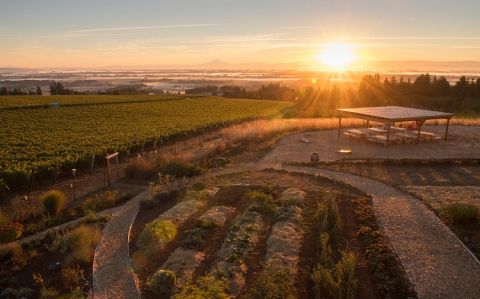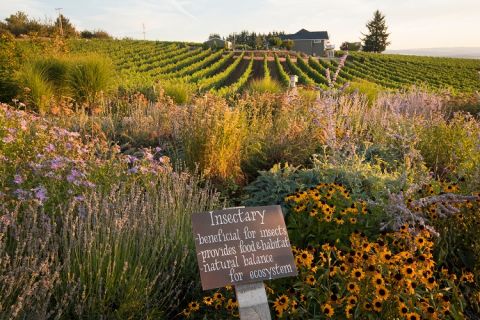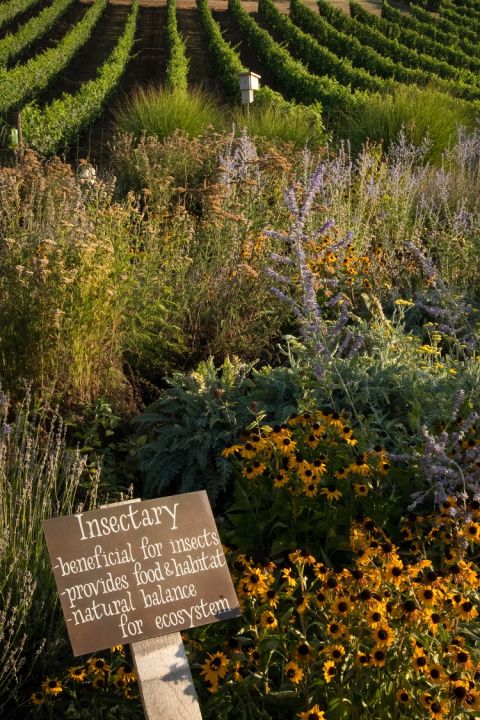6 September 2020 Yet another sustainability hero hails from Oregon, this time the (unedited) entry to our 2020 competition is written by the (very young) owner: 'My name is Pascal Brooks. I’m 24 years old and the owner of Brooks Wines in the Willamette Valley, Oregon. As of two years ago, I’ve been living in Paris, France after following my partner here and the pursuit of her studies. So far, I have been pursuing an informal education in wine, working as an assistant sommelier and server here in the city, while concurrently volunteering and working with several urban agricultural associations innovating for an uncertain future. For the certain future, I will be a harvest intern during harvest for Domaine Ostertag in the Fall of 2020. The rest? On verra …'.
Growing up in Oregon afforded outings that took both moving away and getting older to realize their uniqueness. A weekend well spent may well have involved eating wild salmon or blackberries, hunting for mussels and chanterelles typically under the canopy of our ubiquitous evergreens. Oregon has always remained special to me, both for the bounty of the surroundings, but also because of my memories and who these places are tied to. My father, Jimi Brooks, was a man of many facets, filled with many passions and an incredible appetite for life. He was the founder of our winery, Brooks (established in 1998). He was one of the first to bring biodynamic farming to the Willamette Valley, which led to many of our mornings that started at dawn amongst the vines or in the cellar. After his passing in 2004, it was the hard work of his sister, Janie, and that of his good friend and assistant winemaker, Chris, who took the reins and allowed us to continue with my father’s guiding philosophies: those of Peace, Bread, Land & Wine in the years since. For us, this take on the Bolshevik declaration means maintaining the idea of quality and affordable wine, while also focusing on the health of the land and our community. Given our species dire need to curb global greenhouse gas emissions, we’re continuing to innovate so as to meet the needs of the future with grace and responsibility as we bring our business to the highest standards of sustainability.
Sustainability can be found quite literally in our roots. Influenced by his travels and work in France, pursuit of terroir and discontent with conventional agriculture's propensity to leave the soil barren, my father made it a point to be biodynamic early on. We can say that our holistic approach has had an enormous impact on our 20 acre estate since we first started in 2002. We’ve seen an improvement in the quality of fruit that is not only superior and more interesting, but has also managed to boost biodiversity in our vineyard as well as the health and durability of our vines. We can safely say that because of our nearly 20 years of biodynamic management, we have lessened the environmental cost when it comes to the vines being both dry farmed and tended to by preparations that are primarily sourced from our property. Because of this, we do not require the manufacturing of inputs nor the energy needed to distribute them, let alone their cascading effects on the ecosystem and beyond. In growing our business, pursuing Demeter certification was not a priority, but as of 2013, we’re proud to say that both the winery and vineyard received certification.
We wanted to take my father’s vision for wine and alternative approaches a step further. When it came to building a place of our own in 2014, we wanted to make sure that all aspects of its operation and construction were thought through. Our new site has a commanding view of the Willamette Valley and Cascade mountain range beyond, and rather than placing the building haphazardly on the land, we positioned our building with the intention of causing as little disturbance to the soil as possible. This meant building into the hillside, inturning only a portion of the structure, thus forming our cellar and passive temperature control system. On top of this, the orientation of the building was done so as to support solar panels should we decide to invest in the future, though our current energy demands have been met by local renewable sources. With thick insulation, a reflective exterior, LED lighting, recuperated materials and large windows providing for ample light even during Oregon’s cloudiest days, our new facility mitigates its impact on the globe.
Equipment is given a full life at Brooks and receives expert care and upkeep from our winemaker, Chris Williams. Whenever possible, we like to purchase second-hand so as to give equipment a second life. Over the years, this has included vehicles, barrels, trailers, tractors and forklifts. We frequently rent equipment when in need so as to limit our consumption to the necessary, and choose electric whenever viable. Like most, we’ve tried to shore up our part in the problem of waste by reducing, reusing and recycling whenever possible, including all plastic, glass, and cardboard with our local municipality. For anything biodegradable, we compost so as to later enrich the soil.
A trip to our site will tell you that we are not simply a winery or a vineyard, where a walk through our sprawling biodynamic garden (pictured in both photos above) will have you crossing paths with happy and buzzing pollinators as they make their way to and from the colorful flower flumes to be found everywhere. At Brooks, we’ve gone beyond our biodynamic requirements in the promotion of health and prosperity for local pollinators to great effect! This has included the planting of insecteries, wildlife corridors and focusing on species diversity. Beyond the benefits to the area, our executive chef, Norma Bucholz, returns frequently overloaded with that season’s bounty. Much of the food served in our tasting room is sourced from the land. Following the cycle, we’ve done our best to mitigate our food waste by feeding the hard working hens of our chicken coop or by composting it. Brooks is even proud to sell its own honey from hives found at the bottom of our property.
In pursuit of other ways to be accountable and transparent, in 2019 we became a Certified B Corporation. These are businesses that meet the highest standards of verified social and environmental performance, public transparency, and legal accountability to balance profit and purpose. The certification process included 6 months of preparation followed by a rigorous evaluation of our business, including the expectation that we improve our score in the next 3 years. The certification process led to many positive changes to our business, including a comprehensive employee handbook – something that is not too common for a company who employs less than 20 people – additional holidays for employees; pay increases that ensure a living wage versus a minimum wage; an annual 20 hours of paid volunteering for all full time employees; improved financial and operating transparency to internal and external stakeholders; a code of conduct for all of our supply chain partners attesting to the ethics of their business including their commitment to minority ownership, leadership and employment, their carbon footprint and other sustainability factors. Through these conversations, we were able to convert a grower who farms 20% of our annual grape crop to biodynamics. On top of this, we changed our legal corporate status to that of a Benefit Corporation in Oregon. We stand proud as a Certified B Corporation in a community of 3,300 companies worldwide, 19 of which are wineries, 9 of whom are in our own Willamette Valley.
Another commitment made in 2019 was to become a member of 1% for the Planet, wherein 1% of all our gross revenue is donated to an organization chosen by our team and our community. The one chosen? Kiss the Ground, a non-profit aimed at promoting regenerative agriculture, soil stability, carbon sequestration and rekindling the broken cycle between the consumer and their products. Their work has included seminars, workshops, scholarships and resources for those interested in converting their operation. Our contributions have been directed specifically to a film on biodynamics, a farming scholarship and other educational support.
Brooks is proud to be the only winery in the world that is Certified Biodynamic, a Certified B Corporation and a member of 1% For the Planet. These commitments hold us accountable to published standards and convey transparent messaging to our stakeholders.
At Brooks, having a positive impact on our community is paramount. We owe where we are today because of the support the Oregon wine community gave us after my father passed away, but we’ve started to look beyond the wine industry in having a positive impact. For starters, we know that COVID-19 has had a huge impact on the food and beverage industry, which is why starting August 2020, Brooks is starting a CSA with organic certified Simington Farms, one of the few black-owned farms in the Willamette Valley who have deep roots in the area’s history.
It should go without saying that we would not exist today if it were not for the hard work and dedication of all who have been involved over the years. But no mention of our incredible team would be complete without celebrating the overwhelming number of women in positions of power, including; Janie Heuck (Managing Director), Claire Jurreau (Assistant Winemaker), Heather Kirk (Director of Wine Club Happiness), Norma Buchholz (Executive Chef), Jillian Barnhart (Director of Marketing) and Victoria Kendall (Director of Hospitality), not to mention the countless people that operate the tasting room. Women make up six of the eight members of our leadership team, and I think it is something worth celebrating in a world and society that is trying to reckon with historical inequality.
In light of George Floyd, Black Lives Matter demonstrations and the essential conversations that have arisen since this spring, we recognize that we can have a bigger hand in creating a safe space for Black, Latinx, Asian, Indigenous and People of Color both at Brooks and in the wine industry at large. Starting in June, all of our staff underwent mandatory Diversity, Equity and Inclusion training. We’ve recognized too that there is a historical gap in the accumulation of capital, that the wine industry is an industry that requires assets that many of these groups have been barred from, and that’s why we donated a portion of our proceeds to a scholarship program supporting Association of African American Vintners; a group dedicated to greater representation of black-owned wineries, dispensation of viticultural and enological resources as well as fostering cooperation amongst all industry groups [1]. Lastly, starting this fall, we will be launching a year long program called ‘Beyond Brooks’, whereby $5 from every sale will be donated to Wine Unify, a newly formed non-profit welcoming, supporting, and propelling individuals from these communities who, historically, have not had easy access to the industry. These are the first steps in what we hope is the right and conclusive direction for inclusivity, equity, and representation. We still have work in this respect and know that sustainability means sustainability for all. To take our motto a step further, sustainability should mean ‘land, bread, housing, education, clothing, justice and peace’ for everyone. [2]
Like other producers and industries trying to adapt their business to a world requiring ever more pressing changes, simply ‘our best’ is not good enough. We’ve made steps that we’re proud of, but we know the world cannot afford people hanging on laurels, ‘greenwashing’ or inaction. It’s why beyond ourselves, we’re proud to have become B-corp certified, Demeter, to be partnered with 1% for the Planet, to support our community and our area. This struggle requires evolution, and though we’ve grown immeasurably from the business that my father started, I think that he would be immensely proud of the changes that we’ve made in trying to keep to his original promulgation of ‘peace, bread, land and wine’ – and who knows? Maybe we’ve even added a little bit more definition to these ideas. At the very least, we’re proud too.
Footnotes
[1] Association of African American Vintners https://www.aaavintners.org/about.html#
[2] Black Communities Have Always Used Food as Protest https://www.foodandwine.com/news/black-communities-food-as-protest
Photo credit
All photos are by Andrea Johnson.

















